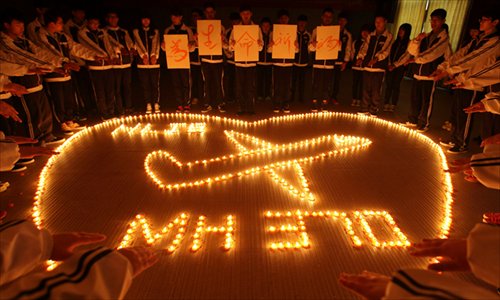HOME >> OP-ED
Disaster prevention needs more input
Source:Global Times Published: 2014-3-11 0:13:01

Students at Hailiang International School in Zhuji, Zhejiang Province, on Monday light up candles to pray for the passengers missing with the Malaysian flight. Photo: CFP
It has been three days since Malaysia Airlines flight MH370 went missing. As of last night, there has still been no real progress made. When will this mysterious incident be resolved in an era with such advanced communication technology? Man's technological capabilities face new challenges.
In the last three days, the news of this missing plane has overshadowed all other news.
The incident took place in Southeast Asia, from where news usually generates less interest than the rest of the world. Malaysia had not made world headlines for years until this tragedy broke the trend.
A total of 239 people disappeared without a trace from the airplane, a transportation tool we are all familiar with. The world is full of discrepancies and frictions, but this incident impresses on us that mankind has a common enemy - forces that take lives. They can be natural calamities or man-made misfortunes.
The resources with which humans can deal with this enemy are not many. There are airplane crashes every year across the globe and deadly accidents involving other forms of transportation are numerous. Natural disasters and diseases claim countless lives.
The direction of human civilization should be confronting these life-consuming forces, but we haven't done enough.
Take research into earthquakes as an example. The most earthquake-prone part of the world does not cover developed countries and people from developing countries are always the victims. Across the globe, investment in earthquake research is tiny and not much progress can be seen in earthquake forecasting.
The world is able to help those in need, but developed societies have only done superficial work and not touched the essence of humanitarianism.
Geopolitical interests are still the core of world order, and humanitarianism has often been ignored. Some countries initiated wars under the name of humanitarianism, which have all caused humanitarian disasters.
Countries have to act independently to keep their citizens safe. For example, whether a country can avoid airplane crashes is determined by its own economic and technological development and social governing ability.
The population of China is much greater than that of all developed Western countries combined. A little improvement in the country's ability to protect its citizens will help save countless lives.
"Life is the most important thing." This has become the loudest slogan in China in recent years. But it requires the hard work of all society to make it into a reality.
China has the highest frequency of natural disasters and can easily be hit by deadly epidemics. Meanwhile, China is also exposed to terrorist attacks. A number of domestic incidents show that the government faces a long-term task in safeguarding citizens' safety.
We are highly concerned over the search efforts for the missing airplane. Meanwhile, we need to invest more to avoid unexpected misfortunes.
As a developing big power, China should set an example for the third world in this regard.
Read more in Special Coverage:

Posted in: Editorial